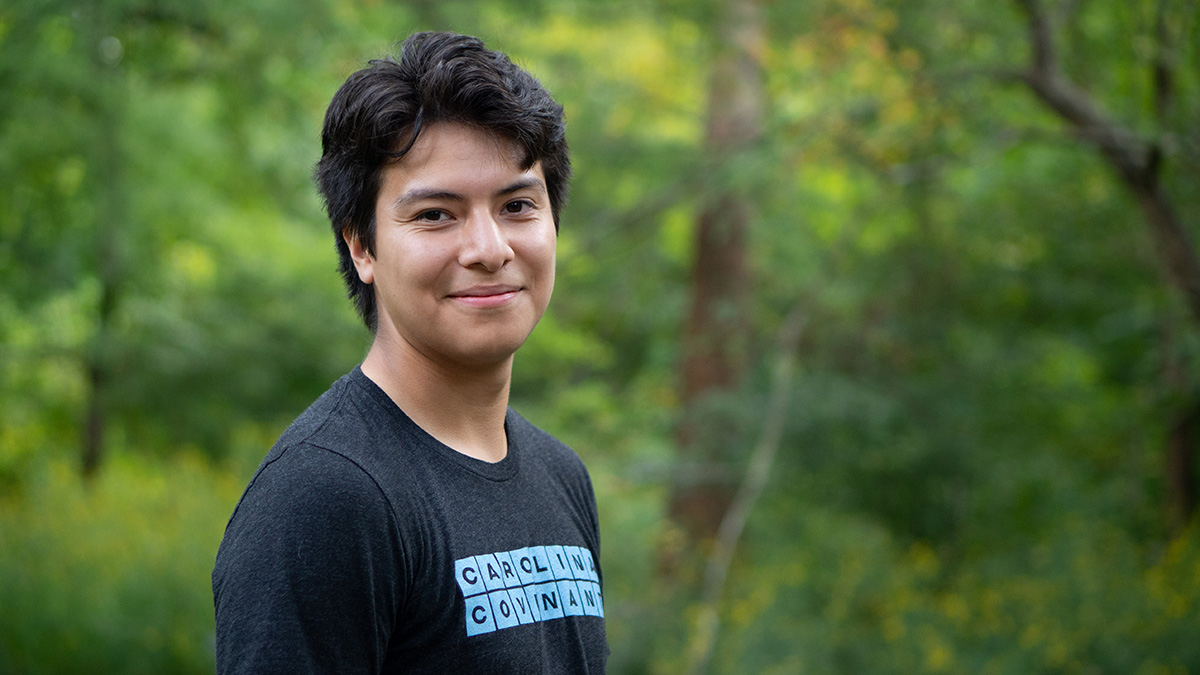Following the narrative
A Carolina Covenant Scholar pursues career-enhancing experiences through the Career Accelerator Program.

Upon graduation, Sonny Griffith ’23 has his sights set on medical school with the eventual goal of working in rural family medicine. But Griffith isn’t following the traditional pre-med trajectory of majoring in chemistry or biology. Instead, he’s “following the narrative” and majoring in English with a concentration in science, medicine and literature.
“Originally, I planned on majoring in chemistry, but as I started taking those courses, I felt that humanities, in general, have something that a STEM major might not give a person,” he said. “In the back of my mind, I’ve always had an interest in addiction and the medicine of addiction. When I was taking STEM classes, I felt like I was missing the narrative. I was learning the science itself, but not much about the history of medicine or how to understand the narrative.”
That interest in the narrative led Griffith to explore science, medicine and literature as a concentration because it combines his interests and provides a strong foundation for what he might otherwise miss as a STEM major. In addition to pursuing this concentration, Griffith spent the summer of 2022 taking part in the Carolina Covenant Career Accelerator Program. The program is designed to guide and support Carolina Covenant Scholars in accessing the social networks, skills and experiences they need to be successful in competitive career fields. Students can access special funding for meaningful, career-enhancing experiences over the summer. A grant from Strada Education Network provided initial funding to the Carolina Covenant in the summer of 2022. Griffith was one of 63 students to benefit from these funds.
Griffith received a grant that allowed him to pursue his own research that examines the parallels of addiction as represented in 19th-century British literature and its connection to the Appalachian region. As part of this research, Griffith also sought to find out what it meant to be classified as an “addict” during that time frame.
During the summer, Griffith was able to travel for his studies: to the University of Kentucky to conduct archival research through primary sources; to history museums in Asheville, North Carolina; and to attend a conference in Washington, D.C., about treatments for opioid addiction.
“The Career Accelerator Program gave me the means to sustain myself while conducting my research,” said Griffith. “It’s given me the opportunity to travel and network that I wouldn’t have had otherwise.”
One of the biggest findings in Griffith’s research was the role that religion played in the moral ground behind addiction.
“Typically, addiction is characterized as, ‘Because this person is suffering from addiction, that must mean there’s some sort of moral problem’,” he noted. “I grew up in the Appalachian region, and religion is such a big part of life there. I’m dealing with how to combine and balance belief and science in a way that’s beneficial to combating addiction.”
The summer experience has opened Griffith’s eyes to ongoing issues in rural areas of the United States, not just Appalachia, and has only affirmed his desire to work in rural family medicine. That hasn’t been the only benefit of the program, though.
“I never had much networking experience prior to the Career Accelerator Program,” Griffith said. “Last summer really pushed me to meet a lot of new people who specialize in the areas that I’m interested in for my research and future career. It’s definitely improved my communications skills, and I think it’s made me a better person in general.”




